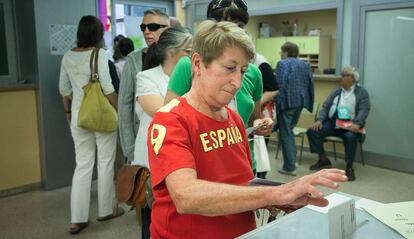Catalan parties cagey on coalition question as electoral deadline looms
Pro- and anti-independence forces playing cat and mouse as they weigh up chances of success in vote

Tomorrow, Tuesday, is the deadline for the registration of coalitions in the regional Catalan elections on December 21, and the likelihood of pro-independence parties joining forces for the vote is shrinking by the minute.
On Sunday, the sacked premier of Catalonia, Carles Puigdemont – who has been named as the candidate for the center-right Catalan European Democratic Party (PDeCAT) in the upcoming elections despite the fact that he is currently in Belgium, and facing charges including rebellion and sedition – called for the formation of a broad group of pro-independence forces for the ballot paper.
The ERC has ruled out reforming the Together for Yes coalition that governed in Catalonia until just two weeks ago
Hours later, the former governing partner of PDeCAT in the Catalan parliament, the Republican Left of Catalonia (ERC) came out in agreement, but with a proviso: that those forces included the radical left-wing CUP party, Catalunya en Comú (Catalonia in Common; the party of Barcelona mayor Ada Colau) and part of Podem, the Catalan branch of Spain’s anti-austerity Podemos party.
Critically, the ERC has ruled out re-forming the Junts pel Sí (Together for Yes) coalition that ruled Catalonia until just two weeks ago, and which was headed up by ERC and PDeCAT with the participation of smaller parties and independents from the pro-secession civic associations the Catalan National Assembly (ANC) and Òmnium.
At a meeting of the national council of the party on Sunday, ERC studied the possibility of forming of grand coalition including left-wing forces such as CUP and Catalunya en Comú but also agreed the party – the strongest pro-independence group according to the polls – would run alone if a coalition could not be formed. In fact the ERC drew up a list of candidates headed by party leader and former Catalan deputy premier Oriol Junqueras, currently being held in pre-trial custody in the Madrid region and also facing charges including rebellion and sedition.

Beyond independence
Both ERC and PDeCAT have emphasized that the December 21 elections are not just about independence. The formations have stated they want to embrace all parties that are against the application of Article 155 in the region by the central government in Madrid – an emergency measure that led to the sacking of Junqueras and Puigdemont, and of the entire Catalan cabinet.
The aim is to put together a list that can win more than 50% of potential votes and a majority of seats in the parliament. On Friday, Puigdemont and Marta Rovira, number two at ERC, called for a unified list but only in a generic manner. Now the ERC have complicated affairs with their “all or nothing” demand.
There are several sticking points. The first is that with the deadline for the registration of coalitions tomorrow, the CUP has still not decided how it will stand in the elections and won’t do so until Friday. Meanwhile Podem is still embroiled in an internal consultation on whether it will stand together with Catalunya en Común, and is not convinced now if the right time for grand coalitions.
Pro-unity parties
The three Catalan parties that don’t support independence – the center-right Ciudadanos, the Catalan Socialist Party (PSC) and the regional branch of Spain’s ruling conservative Popular Party (PP) – are, for the first time ever, using a similar discourse in the run-up to the regional elections: it’s all about defending the unity of Spain, the Spanish Constitution and the Catalan Statute.
However, the idea of a unified list along the lines of that being attempted by the pro-independence parties is not on the table. Instead, the possibility of a post-electoral pact has been touted, although the feeling is it would be very difficult.
The three parties held 52 of the 135 seats in the recently dissolved Catalan parliament, far from the 68 required for an absolute majority. To turn Catalan politics on its head, and create an anti-independence majority, there would have to be a big electoral shift: something that the polls are not indicating.
We are going to the elections alone and won’t make any pre-electoral or post-electoral statements Salvador Illa, Catalan Socialists
Ciudadanos has its nose out in front in the race to the elections because it has acted as the main opposition party. Several days ago, the party approached the other two members of the anti-sovereignty bloc with a proposal that would see the most-voted of the three parties taking control of the Catalan presidency in the event that non-independence parties win the majority of seats on December 21.
But the PSC and the PP said no to the deal, believing it is only a remote possibility.
“We are going to the elections alone and won’t make any pre-electoral or post-electoral statements,” said Salvador Illa, organizational secretary with the PSC, who believes the party can become the most-voted anti-independence group in the Catalan parliament, but who refused to comment on whether the party would accept votes from Ciudadanos and the PP to help make party leader Miquel Iceta regional premier.
For the moment, the fight for votes appears to be above all other considerations with the parties taking potshots at each other. Three months ago, Illa wrote off Ciudadanos describing them as the “home brand” version of the “corruption-hit” PP. Meanwhile, the Catalan socialists have failed to respond to repeated criticisms of the fact that they have twice entered into tripartite governments with the pro-independence ERC.
More than five million voters
A total of 5,553,983 people will have the right to vote in the Catalan regional elections on December 21: 5,329,139 citizens who reside in Catalonia and 224,844 who live overseas, according to Spain's national statistics agency, the INE.
This figure is slightly higher than the total number in the census compiled by the pro-independence movement for the illegal referendum of October 1. In addition, some 136,000 people will be able to vote for the first time, having turned 18 since the last regional elections, held on September 27, 2015.
English version by George Mills.
Tu suscripción se está usando en otro dispositivo
¿Quieres añadir otro usuario a tu suscripción?
Si continúas leyendo en este dispositivo, no se podrá leer en el otro.
FlechaTu suscripción se está usando en otro dispositivo y solo puedes acceder a EL PAÍS desde un dispositivo a la vez.
Si quieres compartir tu cuenta, cambia tu suscripción a la modalidad Premium, así podrás añadir otro usuario. Cada uno accederá con su propia cuenta de email, lo que os permitirá personalizar vuestra experiencia en EL PAÍS.
¿Tienes una suscripción de empresa? Accede aquí para contratar más cuentas.
En el caso de no saber quién está usando tu cuenta, te recomendamos cambiar tu contraseña aquí.
Si decides continuar compartiendo tu cuenta, este mensaje se mostrará en tu dispositivo y en el de la otra persona que está usando tu cuenta de forma indefinida, afectando a tu experiencia de lectura. Puedes consultar aquí los términos y condiciones de la suscripción digital.








































